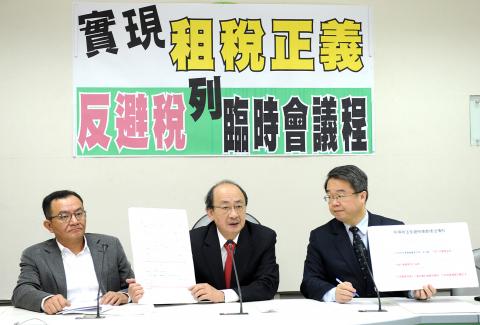The Democratic Progressive Party (DPP) caucus said yesterday that a proposed amendment to the Income Tax Act (所得稅法) would be the party’s main focus in the extra session that begins tomorrow, saying that it is the most important bill to address the issue of “tax justice” in the wake of the revelation of Taiwanese businesspeople’s exploitation of tax havens to avoid paying taxes.
“[The DPP] is proposing this to highlight our call for tax justice and as another test for the Chinese Nationalist Party’s [KMT] core values,” DPP caucus convener Ker Chien-ming (柯建銘) told a press conference.
The press conference was held before the legislative agenda is to be decided in an informal meeting today, in which lawmakers are to discuss the bill proposals to be listed on the agenda of the two-day extra session.

Photo: Lo Pei-der, Taipei Times
A two-year investigation project, conducted by the International Consortium of Investigative Journalists (ICIJ), found that more than 16,000 Taiwanese used “paper companies” in tax havens, such as the British Virgin Islands, to evade taxes.
The Chinese-language CommonWealth Magazine, a partner outlet of the consortium, estimated that up to NT$280 billion (US$9.23 billion) was kept abroad over the past 10 years to avoid taxes.
The DPP planned to propose amending Article 43 of the Income Tax Act to stop corporates from using overseas subsidiaries and paper companies to avoid taxation, Ker said.
The government’s failure to reform tax regulations produced a strange tax revenue structure, in which salaried workers contributed 75 percent of the total tax revenues, Ker said, adding that the tax rate of 12.8 percent in Taiwan ranked seventh lowest in the world and the lowest among Asian countries.
“Taiwan’s tax regulations have always favored the rich and large corporates. It is time to change that. We hope the KMT will not stand in the way,” Ker said.
The proposed amendment was going to the plenary session during the last legislative session in April last year until it was pulled from the agenda by the KMT a month later, DPP Legislator Wu Ping-jui (吳秉叡) said.
The DPP argued that amending the tax code would bring about better results to address fairness and justice, DPP Legislator Gao Jyh-peng (高志鵬) said.
The KMT has said that the amendment could lead to an exodus of more Taiwanese businesses and hurt foreign investment, but Gao dismissed those concerns saying that stricter tax regulations have been a global trend and those businesses trying to evade taxes should not be welcome in Taiwan.
Responding to the DPP’s initiative, KMT caucus secretary-general Lin Te-fu (林德福) said yesterday that the party did not oppose amending the law, but it did not welcome sloppy legislation and would prefer to deliberate the bill in the next legislative session.

Taiwan is stepping up plans to create self-sufficient supply chains for combat drones and increase foreign orders from the US to counter China’s numerical superiority, a defense official said on Saturday. Commenting on condition of anonymity, the official said the nation’s armed forces are in agreement with US Admiral Samuel Paparo’s assessment that Taiwan’s military must be prepared to turn the nation’s waters into a “hellscape” for the Chinese People’s Liberation Army (PLA). Paparo, the commander of the US Indo-Pacific Command, reiterated the concept during a Congressional hearing in Washington on Wednesday. He first coined the term in a security conference last

Prosecutors today declined to say who was questioned regarding alleged forgery on petitions to recall Democratic Progressive Party (DPP) legislators, after Chinese-language media earlier reported that members of the Chinese Nationalist Party (KMT) Youth League were brought in for questioning. The Ministry of Justice Investigation Bureau confirmed that two people had been questioned, but did not disclose any further information about the ongoing investigation. KMT Youth League members Lee Hsiao-liang (李孝亮) and Liu Szu-yin (劉思吟) — who are leading the effort to recall DPP caucus chief executive Rosalia Wu (吳思瑤) and Legislator Wu Pei-yi (吳沛憶) — both posted on Facebook saying: “I

Sung Chien-liang (宋建樑), who led efforts to recall Democratic Progressive Party (DPP) Legislator Lee Kun-cheng (李坤城), was released on bail of NT$80,000 today amid outcry over his decision to wear a Nazi armband to questioning the night before. Sung arrived at the New Taipei District Prosecutors’ Office for questioning in a recall petition forgery case last night wearing a red armband bearing a swastika, carrying a copy of Adolf Hitler’s Mein Kampf and giving a Nazi salute. Sung left the building at 1:15am without the armband and covering the book with his coat. Lee said today that this is a serious

The Ministry of Economic Affairs has fined Taobao NT$1.2 million (US$36,912) for advertisements that exceed its approved business scope, requiring the Chinese e-commerce platform to make corrections in the first half of this year or its license may be revoked. Lawmakers have called for stricter enforcement of Chinese e-commerce platforms and measures to prevent China from laundering its goods through Taiwan in response to US President Donald Trump’s heavy tariffs on China. The Legislative Yuan’s Finance Committee met today to discuss policies to prevent China from dumping goods in Taiwan, inviting government agencies to report. Democratic Progressive Party Legislator Kuo Kuo-wen (郭國文) said